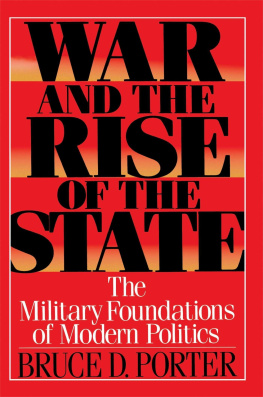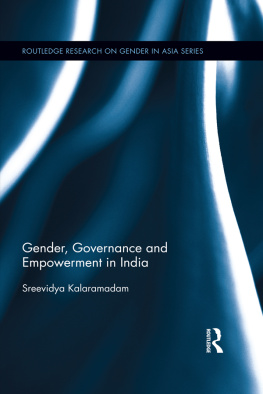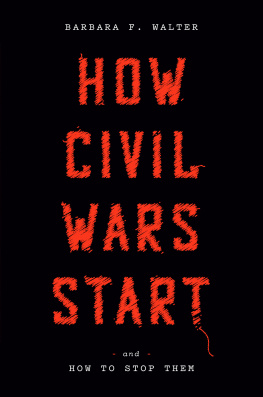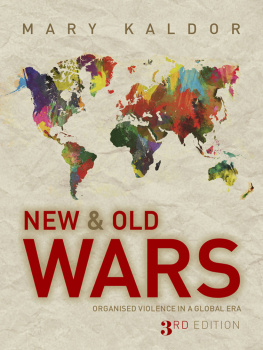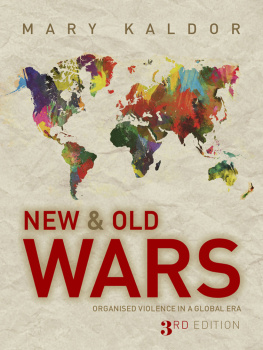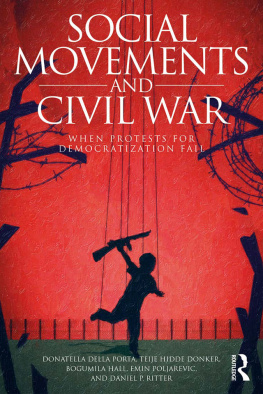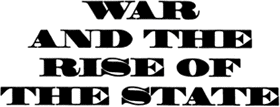BRUCE D. PORTER
The Free Press
1230 Avenue of the Americas New York,
NY 10020
The Free Press
A Division of Simon & Schuster
1230 Avenue of the Americas
New York, NY 10020
www.SimonandSchuster.com
Copyright 1994 by Bruce D. Porter
All rights reserved including the right of reproduction in whole of in part in any form.
The Free Press and colophon are trademarks of Simon & Schuster Inc.
Manufactured in the United States of America
10 9 8 7 6 5 4 3 2 1
Library of Congress Cataloging-In-Publication Data
Porter, Bruce D.
War and the rise of the state : the military foundation of modern politics / Bruce D. Porter.
p. cm
Includes bibliographical references and index.
ISBN: 0-7432-3778-1
ISBN 13: 978-0-7432-3778-9
eISBN 13: 978-1-4391-0548-1
1. ViolenceHistory. 2. Politics and warHistory. 3. WarHistory. 4. State, The. I. Title.
JC328.6.P67 1994303.6dc20 93-29346
CIP
For information regarding special discounts for bulk purchases, please contact Simon & Schuster Special Sales at 1-800-456-6798 or business@simonandschuster.com
DEDICATED TO SAMUEL P. HUNTINGTON MENTOR, COLLEAGUE, FRIEND
Contents
Acknowledgments
Once upon a time, the study of war annoyed me to tears. As an undergraduate trying to master the details of European history, I found wars a great inconvenience, a bothersome interruption in an otherwise sensible flow of history. The historical narrative would shift abruptly to concentrate on battles and combat and death-dealing. Several pages later, history would resume. I know that many historians and social scientists share the frustration I felt then, for those who do not specialize in military history often display a tendency to gloss over periods of war quickly so as to get on with whatever line of narrative or argument they are pursuing.
In my case, frustration gradually gave way to bewilderment as I continued to study European history. I noticed that though the peaceful course of history indeed resumed after every round of hostilities, the end of every major war always seemed to mark the beginning of a new era. The prewar narrative did not in fact resume smoothly in the postwar period. Some kind of revolution had occurred in the interim, and a new world seemed to emerge from every war. I found this puzzling. Why should a war of only a few years duration inaugurate a whole new era? I began to suspect that the wars were more than mere interruptions in history, that they were grand causes of change in their own right. As the publication of this book demonstrates, the study of war ceased to annoy me from that time forth.
War and the Rise of the State was written under the auspices of the Olin Institute for Strategic Studies, which is under the Center for International Affairs, Harvard University, where I served from 1990 to 1993 as the Lynde and Harry Bradley Research Associate in Strategic Studies. The Center provided the ideal atmosphere for undertaking this study, while the unsurpassed resources of Harvard Universitys library system made the task an exceedingly pleasant one. The Bradley Foundation provided funding for the fellowship I held while writing this book, and the Erhardt Foundation contributed funds to provide me with a part-time research assistant during the summer of 1991. I deeply appreciate the support of both foundations.
Writing a book is much like fighting a war. It takes enormous amounts of time and energy, and it can only be accomplished by the collective effort of many individuals. I am fully aware that any expression of gratitude made here will fall far short of what is called for, and I am also mindful that the faults in this work are entirely my own, but its merits owe much to my colleagues. In particular, I owe a great debt to Samuel P. Huntington, the Director of the Institute and a long-time supporter and friend. Professor Huntington encouraged me to join the Olin Institute in 1990 and has been unstinting in his support of my research effort from the beginning. His comments and suggestions on the manuscript have been invaluable. Gratefully, this book is dedicated to him. Stephen P. Rosen, the Associate Director of the Institute, has also been a faithful supporter, and we have had many conversations on war and state formation that have left me enlightened and stimulated.
Several colleagues read portions of the manuscript and provided helpful comments and insights. Mindful that I am probably leaving more than one reviewer out, I nonetheless wish to express gratitude to Charles Cogan, Andrew Cortell, David Herrmann, Malcolm S. Forbes, Jr., Stanley Hoffmann, Richard Hunt, Samuel Huntington, David Kaiser, Eric Nordlinger, Paul Peterson, Kamal Shehadi, Janice Thompson, Charles Tilly, Adam Ulam, and Fareed Zakaria for the time they took to read various chapters of the book. An anonymous reviewer for The Free Press who specializes in Renaissance military history also provided invaluable comments on Chapters 2 and 3. Two part-time research assistants, Frederic Ruiz-Ramon and Jeff Cimbalo, helped me verify much of the historical information and references herein. I feel compelled to note a particular debt to Charles Tilly of the New School for Social Research, not only for the bibliography and comments he provided, but also for the invaluable intellectual path he cut in his own classic works on war and the state.
Every writer owes a considerable debt to his or her publisher. The editorial and production staff of The Free Press have been immensely supportive and helpful throughout this endeavor. Joyce Seltzer encouraged the effort in its early stages and Bruce Nichols, the senior editor responsible for the project, was infinitely patient in pointing out some rough places in the early drafts and brilliantly insightful in his comments and editorial suggestions. The copy editor, Camilla Hewitt, and production staff under Robert Harrington likewise merit nothin but praise.
Last, but far from least, I am thankful for the support and encouragement of my wife, Susan, and my four children, David, Chris, Lisa, and Jennifer, all of whom found it curious that their normally peaceable father would be writing a book on so stormy a subject as war. They bravely put up with more than one war story and only occasionally asked when I would be finished.
I am painfully aware of the fact that any work purporting to draw generalizations about 500 years of history is bound to contain some errors, omissions, and misinterpretations. I am solely responsible for any such inaccuracies, my only excuse being that the fog of war grows denser with the passing of time. I do not believe, however, that any factual errors that may reside in the text will nullify its basic conclusions.
Prologue
THE PARADOX OF WAR
The army, in the words of the writer Robert Heinlein, is a permanent organization for the destruction of life and property. Heinlein captures the essential paradox of every modern military establishment: that it employs large-scale and complex organization toward the ultimate end of physical destruction. War, the most violent of all enterprises, is also the most organized. In no other human endeavornot in commerce, industry, education, religion, science, nor domestic politicsdoes collective action occur on such a large scale. And therein lies much of the burden and tragedy of modern politics, which for nearly five hundred years has been driven by the organizational imperatives of conflict.
The battlefield itself is Chaos Incarnate, the most wretched arena on earth, where death and devastation reign supreme. As William Tecumseh Sherman tersely observed and every soldier in combat knows, war is Hell. It is the blood-swollen god of Stephen Crane, the brain-splattering, windpipe-splitting art of Lord Byron, the epidemic insanity of Ralph Waldo Emerson. But if chaos and destruction are the hallmarks of battle, they are not the totality of war; quite opposite conditions prevail beginning immediately behind the front and extending backward to the seat of government. In the rear, order and regimentation reign. A complex logistics system procures and transports large quantities of equipment and supplies to the front. An encompassing bureaucracy trains and outfits reserve and relief forces. Hundreds of munitions factories manufacture the weapons and materiel of war, employing the most intricate and advanced technologies known to science. In a major war between industrial powers, large segments of the civilian population are mobilized for service in the armaments industry or in burgeoning wartime bureaucracies. A central government directs the whole of this vast effort, using extraordinary, and often extralegal, wartime authority to tax, regulate, confiscate, ration, conscript, and otherwise mobilize the resources required to wage the contest.

